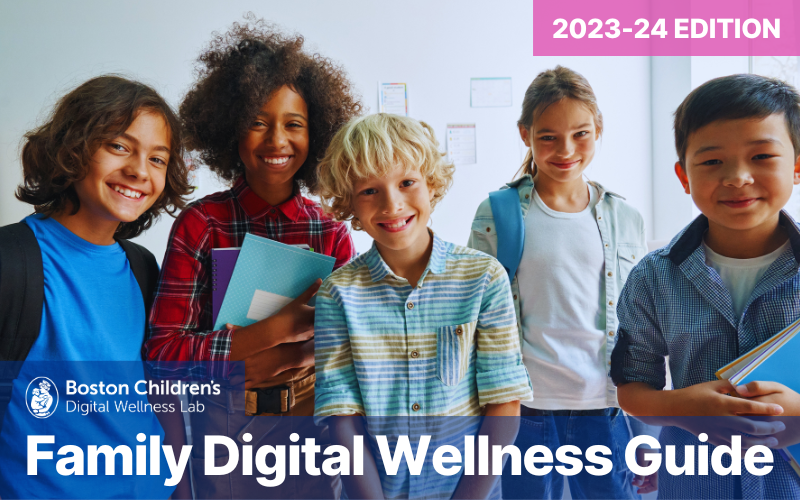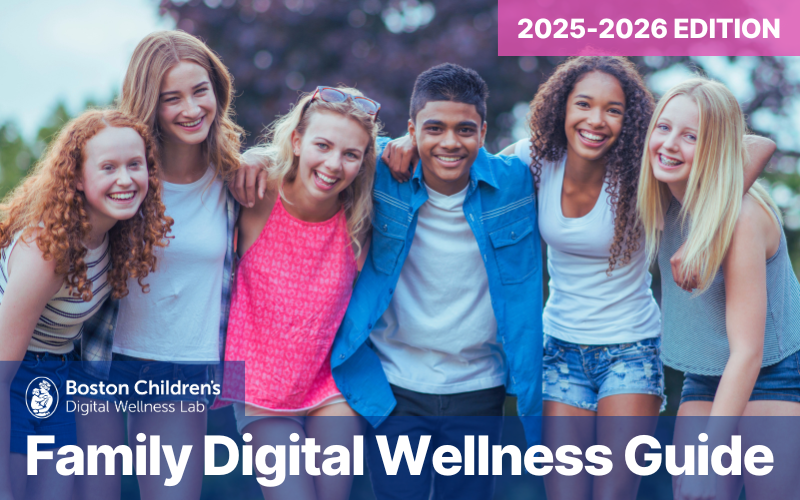

Clinic for Interactive Media and Internet Disorders (CIMAID)
Are you worried about your child or teen’s internet use?
If you think your child or teen’s online activities are causing problems with sleep, school, relationships, or other aspects of their physical, social, and mental health, we can help.
The Clinic for Interactive Media and Internet Disorders (CIMAID) is a specialty clinic within the Division of Adolescent and Young Adult Medicine at Boston Children’s Hospital that evaluates and treats children, adolescents, and young adults – and supports their parents and caregivers – to adopt and sustain healthy lifestyles and behaviors.
We accept all major insurance providers, including MassHealth
If your child is experiencing negative consequences of problematic media and technology use, we encourage you to contact us.
CIMAID accepts patient referrals from clinicians and appointment requests directly from parents and guardians. To request an appointment, please download and complete this intake form and email to cimaid@childrens.harvard.edu or fax to (617) 730-0004.
Frequently Asked Questions
To request an appointment, please download and complete this form and email to cimaid@childrens.harvard.edu or fax to (617) 730-0004. The form asks about your child’s media and technology use, their physical and mental health, and their academic and social experiences.
While it’s not necessary to do so, we recommend that families seek a referral from their primary care physician or pediatrician, to ensure a seamless continuum of care (note that some insurance providers may require this; please check with your provider).
If your child is 18 or older, please also have them complete this form and return with the intake form.
Our clinical team will review completed forms within 1-2 weeks to determine if our clinic is a good fit for your child’s needs. If it is determined to be a good fit, you will receive a phone call to schedule your child’s first appointment. If it is determined to not be a good fit, one of our team members will follow up via phone or email to suggest other options.
The first visit is typically 60-90 minutes and includes the parent(s) or guardian(s) and the child. This initial visit is typically conducted virtually, however in some cases the visit will be conducted in person.
During the intake appointment, our clinician will talk with you and your child separately and together to better understand the issues surrounding your child’s media use. If it is determined that your child is experiencing Problematic Interactive Media Use (PIMU), your clinician will recommend a follow up session to develop a PIMU management plan.
Due to licensing requirements, all new patients must be physically within the state of Massachusetts for their first visit, even when it is conducted via telehealth. If it is prohibitive to come to Boston to be seen in person for the first visit, we can conduct the intake visit via telehealth as long as the patient is physically within the state of Massachusetts. All visits thereafter can be conducted via telehealth and across state lines.
Our waitlist fluctuates based on the patient’s availability and the schedule for their clinician. Currently, our clinicians typically see patients on Tuesdays. We are generally able to see new patients within 3-8 weeks.
At Boston Children’s Hospital, we can see patients up to age 26, however, to ensure consistency of care, we typically accept new patients at CIMAID up to age 24.
We accept all major insurance providers including MassHealth. If you require a referral or need to confirm that a specific provider is covered under your insurance, please contact us directly at cimaid@childrens.harvard.edu to be provided with your clinician’s medical number.
Many children and teens suffering with Problematic Interactive Media Use do not see their use as a problem and don’t believe it’s necessary for them to come to CIMAID. In some cases, they may even refuse to attend their appointment. Here are some things you can do to prepare your child for their visit:
- Give your child advance notice; never surprise them with the CIMAID visit. In a non-confrontational manner, share your concerns and your desire to get a professional’s opinion on how their media use might be impacting their physical, mental, social, and emotional health.
- Explain to your child that you understand that media use is a part of everyday life and that CIMAID will work with them to acquire the tools they need to take control of their media use so it doesn’t interfere with their ability to live a healthy, fulfilling life.
- Many children and teens worry that they will have their devices taken away, either by the doctor or by their parents. Reassure your child that everyone involved will work together to create healthy guidelines around media use and that the goal is not to force them to “quit” their technology, games, or apps.
- Ask your child to think of questions to ask the doctor, so they can play an active role in their visit.
What is Problematic Interactive Media Use (PIMU)?
It is estimated that 1.5-2.1 million adolescents in the United States experience disordered use of interactive media and technology that results in negative consequences to their social and mental well-being and academic outcomes. These problematic use profiles are often referred to by different terms, including gaming addiction, problematic internet use, pornography addiction, or internet addiction, among others.
The term “problematic interactive media use,” or PIMU, was coined by the clinical team at the Clinic for Interactive Media and Internet Disorders (CIMAID) at Boston Children’s Hospital to capture the full spectrum of problematic usage of digital media and technology, including — but not limited to — video games, information-seeking, binge-watching, pornography overuse, and use of social media.
Children and teens experiencing PIMU may also experience other conditions, including Attention Deficit and Hyperactivity Disorder (ADHD), social anxiety, generalized anxiety, depression, and substance use disorders. More research is needed to understand the extent to which the problematic media use causes these challenges versus these issues driving increased media use.
Learn more in our Family Guide to PIMU.

Get our Family Digital Wellness Guide
Our Family Digital Wellness Guide is designed to provide parents and caregivers with information and guidance based on clinical evidence and scientific research. In it, we discuss both the benefits and risks of digital media use and provide strategies for parents and caregivers of children from birth through young adulthood.

Guides for Parents & Caregivers
Our guides cover a variety of topics with detailed advice based on the latest peer-reviewed scientific research. Here you’ll find practical, real-world steps you can take to help you raise healthy, smart, and kind children in our increasingly digital age.
We believe that by following the science, we can create an empathetic and respectful world in which our kids can grow up healthy, smart, and kind.

Subscribe to our email newsletter to receive Lab news & insights
©2026 Boston Children’s Hospital. All rights reserved. Terms of Use Privacy Policy







